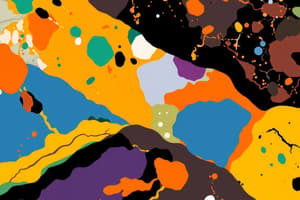Podcast
Questions and Answers
Which of the following best defines a natural hazard?
Which of the following best defines a natural hazard?
- A predictable event that causes damage or loss of life
- A geologic event that causes damage or loss of life (correct)
- A sudden and unexpected event that causes damage or loss of life
- A man-made event that causes damage or loss of life
What are geologic hazards?
What are geologic hazards?
- Events caused by human activities that pose a risk to the environment
- Events caused by seismic activities that pose a risk to human life and property
- Natural events that pose a risk to human life and property (correct)
- Events caused by weather conditions that pose a risk to human life and property
What is the difference between a natural disaster and a natural catastrophe?
What is the difference between a natural disaster and a natural catastrophe?
- A natural disaster refers to a single event, while a natural catastrophe refers to a series of interconnected events
- A natural disaster is caused by human activities, while a natural catastrophe is caused by natural events
- A natural disaster is a smaller-scale event, while a natural catastrophe is a larger-scale event (correct)
- A natural disaster has a higher likelihood of occurring than a natural catastrophe
What is the relationship between hazard, risk, and vulnerability?
What is the relationship between hazard, risk, and vulnerability?
What are the benefits of living near volcanoes?
What are the benefits of living near volcanoes?
Flashcards are hidden until you start studying
Study Notes
Natural Hazards
- A natural hazard refers to a situation or event that has the potential to cause harm to people, the environment, or the economy, and is often associated with geological, atmospheric, or hydrological phenomena.
- Examples of natural hazards include earthquakes, hurricanes, floods, landslides, and volcanic eruptions.
Geologic Hazards
- Geologic hazards are a type of natural hazard that is related to the Earth's geological processes, such as earthquakes, volcanic eruptions, and landslides.
- These hazards can cause damage to buildings, infrastructure, and the environment, and can also lead to loss of life.
Natural Disasters vs. Natural Catastrophes
- A natural disaster refers to a specific event or incident that causes harm to people, the environment, or the economy, such as a hurricane or earthquake.
- A natural catastrophe, on the other hand, refers to a more severe and widespread disaster that affects a larger area and causes significant damage and loss of life, such as a tsunami or massive earthquake.
Hazard, Risk, and Vulnerability
- Hazard refers to the potential for harm or damage from a natural phenomenon, such as a volcano or hurricane.
- Risk refers to the likelihood of a hazard occurring and causing harm.
- Vulnerability refers to the degree to which people, communities, or environments are susceptible to harm from a hazard.
Benefits of Living near Volcanoes
- Despite the potential risks, living near volcanoes can have benefits, such as fertile soil, geothermal energy, and unique landscapes that can attract tourism.
- Additionally, volcanic regions can be rich in mineral resources, such as copper and gold.
Studying That Suits You
Use AI to generate personalized quizzes and flashcards to suit your learning preferences.




